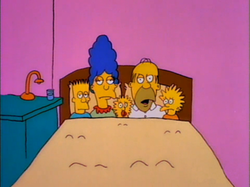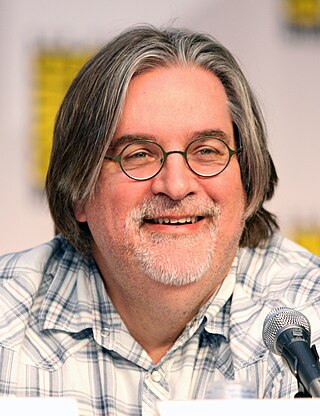
Matthew Abram Groening is an American cartoonist, writer, producer, and animator. He is best known as the creator of the comic strip Life in Hell (1977–2012) and the television series The Simpsons (1989–present), Futurama, and Disenchantment (2018–2023). The Simpsons is the longest-running U.S. primetime television series in history and the longest-running U.S. animated series and sitcom.

The Simpsons is an American animated sitcom created by Matt Groening for the Fox Broadcasting Company. Developed by Groening, James L. Brooks, and Sam Simon, the series is a satirical depiction of American life, epitomized by the Simpson family, which consists of Homer, Marge, Bart, Lisa, and Maggie. Set in the fictional town of Springfield, it caricatures society, Western culture, television, and the human condition.
Marjorie Jacqueline "Marge" Simpson (née Bouvier) is a character in the American animated sitcom The Simpsons and part of the eponymous family. Voiced by Julie Kavner, she first appeared on television in The Tracey Ullman Show short "Good Night" on April 19, 1987. Marge was created and designed by cartoonist Matt Groening while he was waiting in the lobby of James L. Brooks' office. Groening had been called to pitch a series of shorts based on Life in Hell but instead decided to create a new set of characters. He based the character on his mother Margaret Groening. After appearing on The Tracey Ullman Show for three seasons, the Simpson family received their own series on Fox, which debuted December 17, 1989.

Homer Jay Simpson is the protagonist of the American animated sitcom The Simpsons. He is voiced by Dan Castellaneta and first appeared, along with the rest of the Simpsons, in The Tracey Ullman Show short "Good Night" on April 19, 1987. Homer was created by the cartoonist Matt Groening while he was waiting in the lobby of producer James L. Brooks's office. Groening had been called to pitch a series of shorts based on his comic strip Life in Hell but instead created a new set of characters. He named the character after his father, Homer Groening. After appearing for three seasons on The Tracey Ullman Show, the Simpsons received their own series on Fox, which debuted on December 17, 1989.
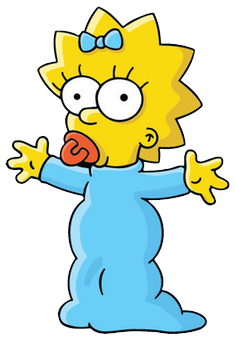
Margaret Lenny "Maggie" Simpson is a fictional character in the animated television series The Simpsons and the youngest member of the Simpson family. She first appeared on television in the Tracey Ullman Show short "Good Night" on April 19, 1987. Maggie was created and designed by cartoonist Matt Groening while he was waiting in the lobby of James L. Brooks' office. She received her first name from Groening's youngest sister. After appearing on The Tracey Ullman Show for three years, the Simpson family was given their own series on the Fox Broadcasting Company which debuted December 17, 1989.

Lisa Marie Simpson is a fictional character in the animated television sitcom series The Simpsons. She is the middle child of the Simpson family. Voiced by Yeardley Smith, Lisa was born as a character in The Tracey Ullman Show short "Good Night" on April 19, 1987. Cartoonist Matt Groening created and designed her while waiting to meet James L. Brooks. Groening had been invited to pitch a series of shorts based on his comic Life in Hell, but instead decided to create a new set of characters. He named the older Simpson daughter after his younger sister Lisa Groening Bartlett. After appearing on The Tracey Ullman Show for three years, the Simpson family were moved to their own series on Fox, which debuted on December 17, 1989.

Bartholomew Jojo "Bart" Simpson is a fictional character in the American animated television series The Simpsons and part of the Simpson family. He is voiced by Nancy Cartwright and first appeared on television in The Tracey Ullman Show short "Good Night" on April 19, 1987. Cartoonist Matt Groening created and designed Bart while waiting in the lobby of James L. Brooks' office. Groening had been called to pitch a series of shorts based on his comic strip, Life in Hell, but instead decided to create a new set of characters. While the rest of the characters were named after Groening's family members, Bart's name is an anagram of the word brat. After appearing on The Tracey Ullman Show for two years, the Simpson family received its own series on Fox, which debuted December 17, 1989. Bart has appeared in every Simpsons episode except "Four Great Women and a Manicure".
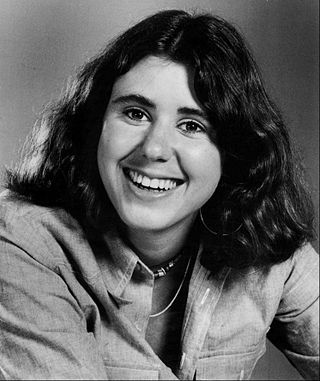
Julie Deborah Kavner is an American actress. Known for her voice role as Marge Simpson on the animated television series The Simpsons, Kavner first attracted notice for her role as Brenda Morgenstern, the younger sister of Valerie Harper's title character in the sitcom Rhoda, for which she won a Primetime Emmy Award for Outstanding Supporting Actress in a Comedy Series. She also voices other characters for The Simpsons, including Marge's mother, Jacqueline Bouvier, sisters Patty and Selma Bouvier, and half-step-great-aunt Eunice Bouvier.

"Simpsons Roasting on an Open Fire" is the series premiere of the American animated television series The Simpsons. It first aired on Fox in the United States on December 17, 1989. Introducing the Simpson family into half-hour television in this episode, Bart Simpson disobediently gets a tattoo without the permission of his parents. After Marge spends all the family's holiday budget on having it removed, Homer learns that his boss is not giving employees Christmas bonuses, and takes a job as a shopping mall Santa.
"Bart the Genius" is the second episode of the American animated television series The Simpsons. It originally aired on the Fox network in the United States on January 14, 1990. It was the first episode written by Jon Vitti. It is the show's first normal episode as well as the first to use the signature title sequence, though this version is much different from the one subsequently used, from the second season to the twentieth season. In the episode, Bart cheats on an intelligence test and is declared a genius, so he is sent to a school for gifted children. Though he initially enjoys being treated as a genius, he begins to see the downside of his new life.

The Tracey Ullman Show is an American television sketch comedy variety show starring Tracey Ullman. It debuted on Fox on April 5, 1987, as the network's second original primetime series to air following Married... with Children, and ran for four seasons and 81 episodes, until May 26, 1990. The show was produced by Gracie Films. The show blended sketch comedy with musical numbers and dance routines, choreographed by Paula Abdul, along with animated shorts. The format was conceived by creator and executive producer James L. Brooks, who was looking to showcase the show's multitalented star. Brooks likened the show to producing three pilots a week. Ullman was the first British woman to be offered her own television sketch show in both the United Kingdom and the United States.

The Itchy & Scratchy Show is a fictional animated series featured on The Simpsons. The cartoon depicts a blue mouse named Itchy, and a black cat named Scratchy, who repeatedly maim or kill each other. It is typically presented as 15- to 60-second shorts that are a part of The Krusty the Clown Show. Itchy & Scratchy is filled with graphic violence that almost invariably prompts laughter from The Simpsons characters, especially Bart and Lisa.
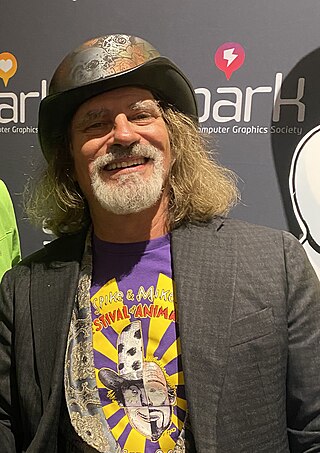
David Silverman is an American animator who has directed numerous episodes of the animated television series The Simpsons, as well as its 2007 film adaptation. Silverman was involved with the series from the very beginning, animating all of the original short Simpsons cartoons that aired on The Tracey Ullman Show. He went on to serve as director of animation for several years. He also did the animation for the 2016 film The Edge of Seventeen, which was produced by Gracie Films.
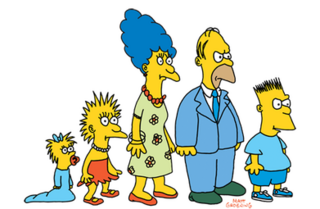
The Simpsonsshorts are a series of animated short films that aired as a recurring segment on Fox variety television series The Tracey Ullman Show for three seasons, before the characters spun off into The Simpsons, their own half-hour prime-time show. They feature Homer, Marge, Bart, Lisa, and Maggie, and a few secondary characters. The series was created by Matt Groening, who designed the Simpson family and wrote many of the shorts. The shorts first aired on April 19, 1987 starting with "Good Night". The final short to air was "TV Simpsons", originally airing on May 14, 1989. The Simpsons later debuted on December 17, 1989, as an independent series with the Christmas special "Simpsons Roasting on an Open Fire".

"Some Enchanted Evening" is the thirteenth and final episode of the first season of the American animated television series The Simpsons. It was originally broadcast on the Fox network in the United States on May 13, 1990. Written by Matt Groening and Sam Simon and directed by David Silverman and Kent Butterworth, "Some Enchanted Evening" was the first episode produced for season one and was intended to air as the series premiere in fall 1989, but aired as the season one finale due to animation problems. The Christmas special "Simpsons Roasting on an Open Fire" premiered in its place on December 17, 1989. It is the last episode to feature the original opening sequence starting from "Bart the Genius". In the episode, Homer and Marge go on a night out while leaving the children under the care of a diabolical babysitter named Ms. Lucille "Botz" Botzcowski.
Gábor Csupó is a Hungarian animator, writer, director, producer and graphic designer. He is co-founder of the animation studio Klasky Csupo, which has produced shows like Rugrats, Duckman, Stressed Eric, Rocket Power, As Told by Ginger, and Aaahh!!! Real Monsters.
"The Simpsons 138th Episode Spectacular" is the tenth episode of the seventh season of the American animated television series The Simpsons. It originally aired on the Fox network in the United States on December 3, 1995. As the title suggests, it is the 138th episode and the third clip show episode of The Simpsons, after "So It's Come to This: A Simpsons Clip Show" and "Another Simpsons Clip Show".
"Bart's Dog Gets an 'F'" is the sixteenth episode of the second season of the American animated television series The Simpsons. It originally aired on the Fox network in the United States on March 7, 1991. In the episode, the Simpson family's dog, Santa's Little Helper, infuriates Homer and Marge by destroying a family heirloom and an expensive pair of shoes. When Marge and Homer want to get rid of the dog, Bart enrolls him at an obedience school to curb his bad behavior.

The Simpsons is an American animated television sitcom starring the animated Simpson family, which was created by Matt Groening. He conceived of the characters in the lobby of James L. Brooks's office and named them after his own family members, substituting "Bart" for his own name. The family debuted as shorts on The Tracey Ullman Show on April 19, 1987. After a three-season run, the sketch was developed into a half-hour prime time show called The Simpsons, which debuted on December 17, 1989. The show was an early hit for Fox, becoming the first Fox series to land in the top 30 ratings in a season (1990).

The Simpsons is an American animated comedy franchise whose eponymous family consists of Homer, Marge, Bart, Lisa, and Maggie. The Simpsons were created by cartoonist Matt Groening for a series of animated shorts that debuted on The Tracey Ullman Show on Fox on April 19, 1987. After a three-season run, the sketch was developed into The Simpsons, a half-hour prime time show that was an early hit for Fox, becoming the first Fox series to land in the Top 30 ratings in a season (1989–1990). The popularity of The Simpsons has made it a billion-dollar merchandising and media franchise. Alongside the television series, the characters of the show have been featured in a variety of media, including books, comic books, a magazine, musical releases, and video games.
